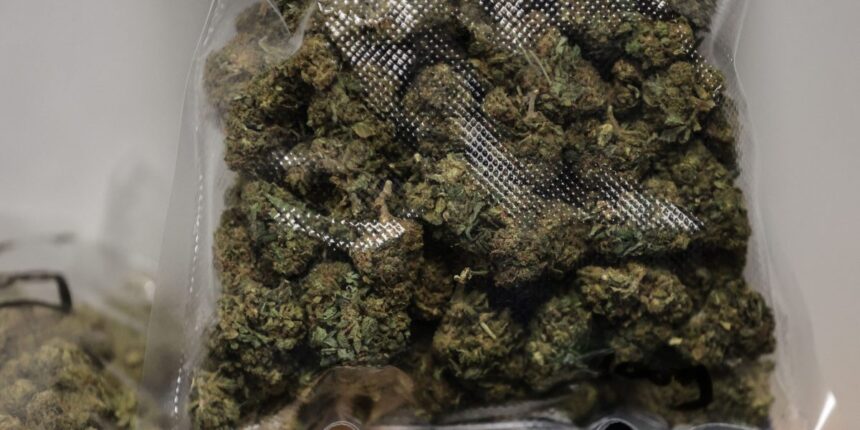
One shipment was disguised as camera equipment. Another as shiitake mushrooms.
But when law enforcement cracked open crates to look closer, they discovered thousands of pounds of marijuana worth tens of millions of dollars.
The Oklahoma Bureau of Narcotics has twice this year caught massive caches of illegal weed packed in trucks heading to New York and New Jersey.
On Wednesday, authorities raided a warehouse in Oklahoma City being used as a distribution hub for marijuana trafficking, seizing almost 7,000 pounds of marijuana worth almost $28 million. That followed a similar operation in April when they stopped about 7,000 pounds going in the same direction.
Mark Woodward, a spokesperson for Oklahoma’s Bureau of Narcotics, said activity in his state has soared as criminals are taking advantage of cheap land and legal loopholes to profit from the illegal trade.
“On any given day, there are shipments of marijuana going from Oklahoma farms to the black market all over the US,” he said.
New York is particularly enticing for the illegal cannabis business. That’s partly because of the problematic rollout of legal recreational marijuana, with critics saying excessive regulations and a complicated licensing process have stymied legitimate efforts.
Illegal dispensaries have popped up all over the state, with New York City Mayor Eric Adams estimating the number operating in the Big Apple alone was about 1,500 in February. The state meanwhile has issued more than 200 licenses but only lists about 20 open dispensaries.
In June, the state’s Department of Taxation and Finance and Office of Cannabis Management inspected 33 storefronts in New York, Ithaca and Binghamton, seizing at least 1,000 pounds of illicit cannabis worth over $11 million, according to Governor Kathy Hochul. Last week, New York police and state tax agents raided dispensaries in Lower Manhattan and more recently Manhattan District Attorney Alvin Bragg reached an agreement to ban 11 stores, mostly on the Upper West Side, from selling illegal cannabis products.
Perfect Storm
For all New York’s efforts, authorities still don’t have a good sense of where the weed is coming from. Cannabis sold legally in the state is typically grown within its borders and is subject to extensive regulations, driving up costs for cultivators and consumers alike.
Oklahoma though has emerged as one of the simplest places to grow the crop. It legalized medical marijuana in 2018 and licenses to sell cost just $2,500.
The regulatory framework is also far less stringent than in other states. That’s encouraged growers to move from places like California and Nevada — among the first to legalize recreational marijuana use — to Oklahoma, a trend Woodward said the state continues to see.
The state had more than 9,000 licensed cannabis farms by the end of 2021, exceeding the number in California, according to the New York Times.
The amount got so high, Governor Kevin Stitt signed a moratorium on new growing, processing and dispensing licenses last year, which will run until August 2024. Voters also rejected the legalization of recreational marijuana in March.
The state’s legislature tried to intervene further this year by imposing stricter limits on who could obtain medical marijuana cards and how much THC, the compound in cannabis that gets you high, could be in each serving sold. But Stitt vetoed the bill in June because those measures were paired with a delay on enacting higher licensing fees.
“As illegal grow operations and bad actors continue to be the primary issue facing the industry, it is unwise to repeal changes designed to curb their participation in the market in exchange for improvement to other areas of the state’s program,” he wrote in his veto note for the bill.
Oklahoma’s Bureau of Narcotics is working with its state counterparts in New York and other states, as well as the federal Drug Enforcement Agency, to clamp down on the illegal trafficking, said Woodward.
But he said they’re confronting the illicit activity every day.
“We’re either raiding a farm or a warehouse and shutting it down,” he said. “It really is a constant battle against these criminal organizations.”








